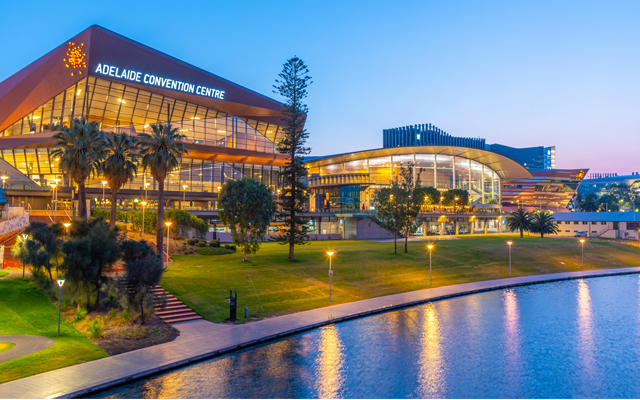Armed with Covid-safe practices, a hunger for knowledge, and fresh hotel deals, Adelaide is confident in its MICE positioning once borders open.
Being a boutique city can be sometimes be interpreted as code for a small city trying to stand out. But it is perhaps a sign of our times that it is exactly Adelaide’s boutique credentials that are stacking the odds in her favour.
As one of Australia’s smallest cities and a second-tier destination, Adelaide’s size and geographical layout have helped keep all her charms intact with few lockdowns and a mostly Covid-free environment.

And she is fiercely trying to keep it that way to encourage a reboot of the events industry with new products ready to entice the upper-end of the market. These include five-star hotels, function spaces and experiences, all of which were presented at the showcase event Destination South Australia (DSA) held February 10-13, 2021.
Among these were the Crowne Plaza, the luxurious Oval Hotel, and Eos by Skycity, which is Adelaide’s long-anticipated integrated entertainment complex. Also in the pipeline is a new Sofitel, Hyatt and Westin.
Safety first
The folks at the Adelaide Convention Bureau (ACB) are well aware that none of the above are selling points without a solid reputation for safety and hygiene in a Covid-conscious world.
“So back in June, we met with 10 of our members to develop a Safe SA campaign,” said Damien Kitto, CEO of ACB.
“It was all about developing an end-to-end solution and process where, from your arrival at the airport to your transport to hotels, venues and your trip home, everyone would operate on the same processes and procedures…to deliver that safe and healthy experience,” he explained.
“We’re the only capital city in Australia that has taken that approach and our campaign is one reason why I’m sure the ACB has managed to lead Australia for business events. We’re really proud that 85 per cent of events for 2020 have been rescheduled to either this year or next, which is a phenomenal effort,” he continued.
The campaign was followed by a local pilot event in October with about 200 participants to instil confidence for events in the sector. And there are definite signs the strategy is working.
“While Covid-19 has certainly impacted (our) business levels, we’ve been fortunate that the South Australian experience has been vastly different from other places around the world,” said Simon Burgess, general manager, Adelaide Convention Centre (ACC).
“We recently welcomed almost 10,000 delegates across five events during a single week. This included our annual Cellar Door Fest, an F&B consumer exhibition which drew 7,500 visitors; an industry tradeshow; plus conferences in the agriculture and financial sectors,” he continued.
Burgess admits that while ACC has a “healthy number of events on the books” until June 2021 from local and national events, he does not expect all of them to materialise and there is still a need to think on their feet.
Hosting the 38th International Symposium on Combustion in January for example, meant the event was quickly modified into a hybrid meeting and ultimately, in the 10 days leading up to the event, moved to a fully online format supported by the ACC’s new Technology Production Suite. The Suite features event pre-visualisation and virtual walk-throughs – especially useful for remote guests.

Power in small, frequent events
Moving forward, the ACB is keen to see international border restrictions lifted for the bigger prize of a “long economic tail” that only comes from global events like the International Astronautical Congress, which it hosted for the first time in 2017 and is bidding for again for 2024.
“We had almost 4,500 people from around the world (in 2017) and that was an incredible test which we passed with flying colours,” said Kitto.
“From that particular event, the Australian space agency, a Cooperative Research Centre and the development of a mission control or ecosystem of industry around defence and space were announced. So it’s about how we can develop for the future growth of Adelaide and international events are critically important for how trade and investment, and the exchange of information takes place. That’s why we’re desperate for international business to come back.”
Kitto said the strategy for Asia has had to change too. “It’s changed because everyone’s changed. I think the opportunity, particularly for corporate incentives is that we are a new destination with fresh products and experiences.
“We all appreciate that large events in the short- to medium-term probably aren’t going to take place. But small, frequent waves of corporate incentive guests coming from China or across Asia is an absolute high probability and I think Adelaide is positioned really well (for those),” he mused.
New data from DSA seems to underscore Kitto’s confidence. Barring any cancellations, almost A$40 million (US$30.4 million) in business was won from events with less than 30 delegates in attendance. Surveys also showed 94 per cent of attendees were now more likely to consider Adelaide for their events.
“Adelaide is very accessible for meetings and conferences,” said DSA attendee Mia Yip, head of events at the Australian Property Institute. “Competitive prices make it a great opportunity to really get creative with your event theming, catering and delegate experience.”





















